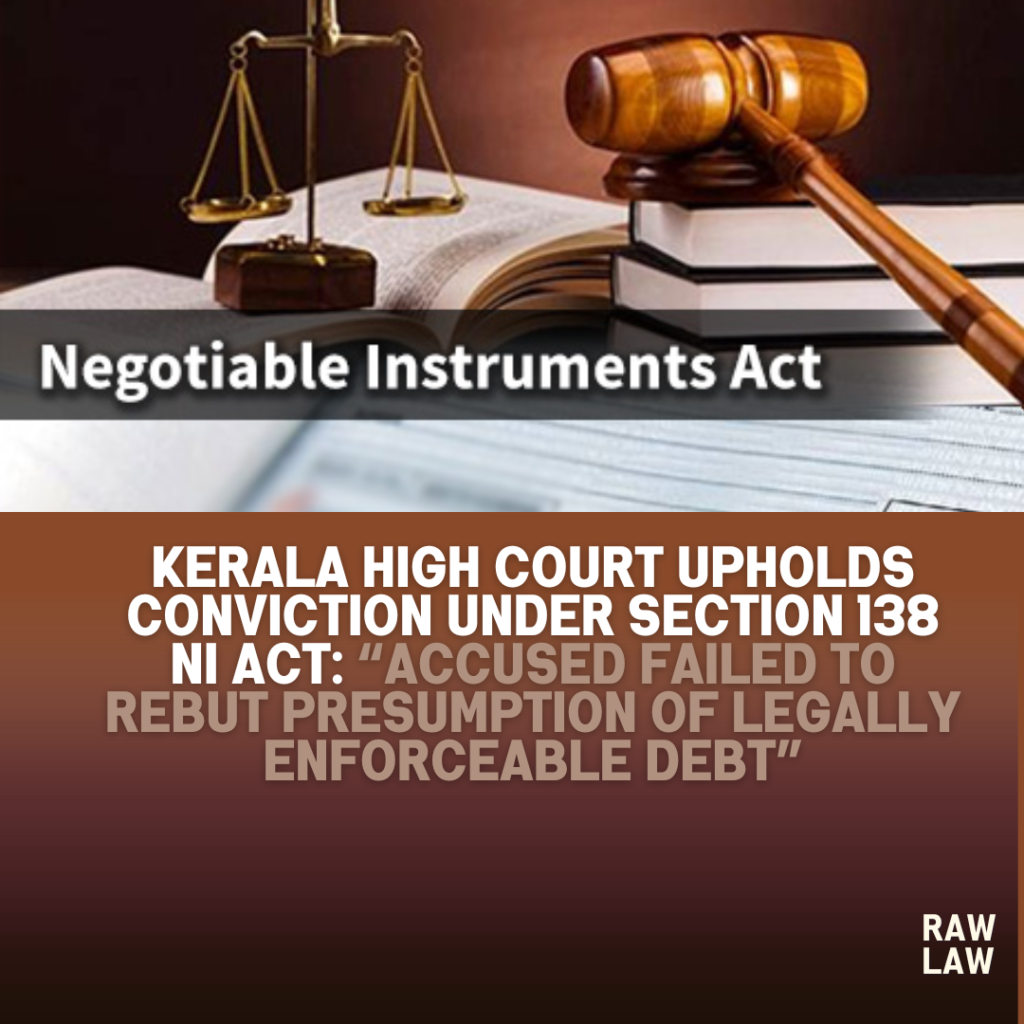Court’s Decision
In Criminal Appeal No. 774 of 2007, the Kerala High Court upheld the conviction and sentence imposed by the trial court on the appellant under Section 138 of the Negotiable Instruments Act, 1881. The appellant was sentenced to undergo simple imprisonment for six months and to pay a compensation of ₹2,50,000 to the complainant under Section 357(3) of the Code of Criminal Procedure.
The High Court, after considering the documentary and oral evidence, concluded that the accused failed to rebut the statutory presumptions under Sections 118(a) and 139 of the NI Act and that the trial court rightly convicted him for dishonour of cheque issued in discharge of legally enforceable debt.
Facts
The complainant alleged that the accused had borrowed a sum of ₹2,50,000 on 10.09.2003 and issued a cheque bearing No. 893134 dated 29.09.2003 for the said amount. The cheque, when presented for encashment, was returned with the endorsement “Funds Insufficient”. The complainant issued a statutory demand notice on 07.10.2003, which was received by the accused on 08.10.2003. Despite receipt of notice, no payment was made, leading to the filing of a complaint under Section 138 of the NI Act.
Before the trial court, the complainant was examined as PW1, and Exts. P1 to P6 were marked, which included the cheque, return memo, demand notice, postal receipt, and acknowledgment. The accused did not produce any documents or witnesses in defence.
Issues
- Whether the cheque was issued by the accused in discharge of a legally enforceable debt.
- Whether the presumption under Sections 118(a) and 139 of the NI Act stood rebutted by the accused.
- Whether the trial court erred in convicting the appellant without independent corroboration of the transaction.
Petitioner’s Arguments
The appellant (accused) contended that:
- The complainant failed to prove the source of the funds allegedly lent to the accused.
- The cheque was issued only as a security and not in discharge of any debt or liability.
- The complainant failed to examine any independent witness to prove the alleged loan transaction.
- There was no evidence regarding any document executed at the time of the loan.
It was further argued that mere production of the cheque is insufficient without proof of a corresponding legally enforceable debt.
Respondent’s Arguments
The complainant submitted that:
- The cheque was issued by the accused and returned due to insufficiency of funds.
- A valid statutory notice was served, and the accused failed to make the payment within 15 days.
- The accused did not produce any evidence to rebut the presumption under Sections 118(a) and 139 of the NI Act.
- The law is well settled that the presumption under Section 139 is in favour of the holder of the cheque unless rebutted by cogent evidence.
- No plausible explanation was offered as to why the cheque was issued if not in discharge of a liability.
Analysis of the Law
The High Court reiterated that Section 139 of the NI Act provides a statutory presumption that the cheque was issued in discharge of a debt or other liability. This presumption is rebuttable, but the burden lies on the accused.
The Court further stated that to rebut the presumption, the accused must raise a probable defence either by cross-examination of the complainant or by leading defence evidence. However, in the present case, the accused neither adduced any evidence nor established a probable defence.
It held that the mere denial of liability is insufficient to rebut the statutory presumption. The accused had not even suggested a plausible explanation for the issuance of the cheque.
Precedent Analysis
Although the judgment did not cite specific case law, the following established principles were implicitly followed:
- Kumar Exports v. Sharma Carpets, (2009) 2 SCC 513: Once the cheque is admitted, the presumption under Section 139 arises. The accused must rebut the presumption by raising a probable defence.
- Rangappa v. Sri Mohan, (2010) 11 SCC 441: Presumption under Section 139 includes the existence of a legally enforceable debt unless rebutted by the accused.
- Krishna Janardhan Bhat v. Dattatraya G. Hegde, (2008) 4 SCC 54: The presumption under Section 139 is rebuttable by proof to the contrary.
Court’s Reasoning
The High Court held that:
“The accused has not adduced any evidence to rebut the statutory presumption. There is no valid defence raised to displace the burden under Sections 118(a) and 139 of the NI Act.”
The Court emphasized that the trial court was correct in drawing the presumption of liability and held that the complainant had discharged his initial burden. As the accused offered no rebuttal evidence and no plausible defence, the conviction was legally sound.
The Court also approved the sentence imposed and the compensation awarded under Section 357(3) of CrPC as reasonable and in conformity with law.
Conclusion
The High Court dismissed the criminal appeal, upholding:
- The trial court’s conviction of the accused under Section 138 of the NI Act.
- The sentence of six months simple imprisonment.
- The direction to pay compensation of ₹2,50,000 to the complainant under Section 357(3) CrPC.
Implications
This judgment reaffirms the evidentiary burden in cheque dishonour cases under Section 138 NI Act. It underscores that:
- Once the issuance of the cheque is admitted, the burden shifts to the accused to rebut the presumption.
- Mere denial or unsubstantiated allegations that the cheque was issued as “security” will not suffice.
- Convictions can be sustained even in the absence of independent witnesses, provided the complainant’s version is credible and unrebutted.
The decision sends a clear message that statutory presumptions under the NI Act are potent tools for ensuring the sanctity of commercial transactions and cannot be displaced without substantive rebuttal.



